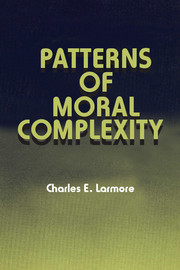Book contents
- Frontmatter
- Contents
- Preface
- Acknowledgments
- Chapter 1 MORAL JUDGMENT – AN ARISTOTELIAN INSIGHT
- Chapter 2 THE LIMITS OF NEO-ARISTOTELIANISM
- Chapter 3 LIBERALISM AND THE NEUTRALITY OF THE STATE
- Chapter 4 THE POLITICAL ORDER AND PERSONAL IDEALS
- Chapter 5 POLITICAL ROMANTICISM
- Chapter 6 THE HETEROGENEITY OF MORALITY
- CONCLUSION
- Notes
- Bibliography
- Index
CONCLUSION
Published online by Cambridge University Press: 05 June 2012
- Frontmatter
- Contents
- Preface
- Acknowledgments
- Chapter 1 MORAL JUDGMENT – AN ARISTOTELIAN INSIGHT
- Chapter 2 THE LIMITS OF NEO-ARISTOTELIANISM
- Chapter 3 LIBERALISM AND THE NEUTRALITY OF THE STATE
- Chapter 4 THE POLITICAL ORDER AND PERSONAL IDEALS
- Chapter 5 POLITICAL ROMANTICISM
- Chapter 6 THE HETEROGENEITY OF MORALITY
- CONCLUSION
- Notes
- Bibliography
- Index
Summary
The fundamental aim of this book has been to show why moral philosophy must outgrow the simplifications that have beset its past. My intention, however, has not been to deny the possibilities or the importance of moral theory. I do not believe that the complexity of morality is so great, so boundless, that it baffles any attempt at systematization. I have argued, instead, that in three fundamental respects it eludes the simplistic notions of moral order with which moral philosophy, ancient and modern, has generally operated.
Let me summarize, once again, what these dimensions of moral complexity are. First, virtue cannot be understood simply as conscientious adherence to principle, because the moral rules associated with many of the virtues require the use of judgment if we are to know when and how we should exercise these virtues. Secondly, moral considerations having a decisive and overriding authority within the political realm do not have to have a similar priority outside that realm, in our “personal ideals.” Thus, neutrality can be the paramount political value of the liberal state, without having to supplant in other areas of social life the constitutive attachments that we may have to some specific and controversial idea of the good life. Finally, instead of supposing that the structure of morality must be in the end either deontological or consequentialist, and instead of assuming that either all or none of our moral obligations are categorical, we should recognize that the ultimate sources of moral value are not one, but many.
Information
- Type
- Chapter
- Information
- Patterns of Moral Complexity , pp. 151 - 153Publisher: Cambridge University PressPrint publication year: 1987
